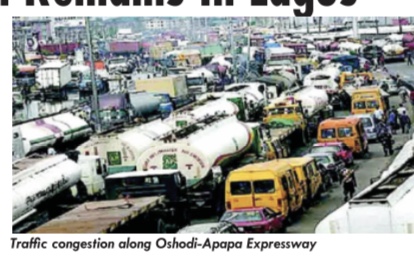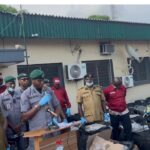By MARAN
Shortly before the long-standing traffic congestion on the ports access in Lagos disappeared recently, MARAN NEWSPAPER sought views of critical stakeholders concerning what has become a national embarrassment. The verdict: develop other ports and reduce attention on Lagos.
Unless other seaports in Nigeria are developed and put into use, traffic congestion at Apapa port corridor continues despite recent reprieve on the Tincan corridor,
National President, Oil and Gas Service Providers’ Association of Nigeria, Mazi Colman Obasi has stated.
He said if Nigeria was refining its crude oil locally, there would have been no need for petro-tanker trucks and containers to gather at Apapa.
“We have God-made sea ports in different parts of the country that should have been developed and oil tank farms sited near them.
“There are sea ports in Warri, Port Harcourt, Calabar, including the natural deep seaport, Oron, Akwa Ibom State, among others”.
Also, former Chairman of the Presidential Task Force on Apapa traffic, Dr. Kayode Opeifa, said: “Whatever you see in Apapa now must be the creation of some individuals or group of people.
“Apapa should be better off and free of any traffic situation.
The government institutions that are saddled with the responsibility of managing the traffic should be seen to be on top of the situation.”
A Lagos state official who spoke on condition of anonymity said the state government has already intervened with the view to addressing the fresh crisis.
“There are bad elements at the ports”, he explained, “but we need to join hands together to bring sanity to the situation. I’m aware a committee has been set up to resolve the fresh crisis and restore sanity in the area.”
Checks by MARAN Newspaper showed that businesses might be losing over N100 billion monthly as containers and petrol tankers continue to stay permanently on Apapa port corridor and environs in Lagos, where Tin Can and Apapa ports, factories, bonded terminals and other corporate organisations carry out their operations.
In a telephone conversation, National President, National Council of Managing Directors of Licensed Customs Agents, Mr. Lucky Amiwero based his estimation of losses on the turnaround time of tankers and the cost of personnel involved in different transactions.
He said: “It is not an easy problem. The losses are huge and can be estimated at over N100 billion monthly. Some interventions have been made, but sadly, the petrol tankers and containers continue to occupy the roads.
“The situation is worsened by the huge presence of tank farms in Apapa. We are an oil-producing nation that should not only export crude oil but also process our petroleum products.
If everything is working well, we would not need tank farms.”
Similarly, another operator who pleaded anonymity said: “The turnaround trip should be about 72 hours. But it takes many days and weeks to transact business. Moreso, we also pay a lot as welfare cost in servicing vehicles and welfare of drivers, among others.”
Recall that the presence of trucks and tankers have caused many accidents and loss of lives.
It also indicated that the police, Federal Road Safety Corps (FRSC) and other traffic-related agencies have encountered different challenges in the process of managing traffic and maintaining law, order as well as security in Apapa and its environs.
Other industry watchers who spoke to MARAN said that some of the many tank farms have large holding bays; some have small spaces while some do not have spaces at all for parking.
Industry regulator, the Nigerian Midstream and Downstream Petroleum Regulatory Authority (NMDPRA) makes availability of parking lots a pre-condition for the establishment and operation of tank farms in Nigeria.
The sordid traffic situation is worsened by tanker and truck owners that have no targeted destinations. They permanently occupy the roads while waiting to be hired by persons and businesses that have consignments to deliver.
It was also gathered that even some trucks with targeted destinations prefer staying on the roads to spaces provided for them at the ports as they intend to not only evade parking fees but also consider it faster to get to the ports after paying tips to security agencies happily waiting to collect same.
As part of efforts in progress to resolve the logjam, Port Manager, Lagos Port Complex (LPC) Mr. Charles Okaga told MARAN NEWSPAPER that the Federal Government, through the Ministry of Petroleum Resources, was already in talks with tanker owners and drivers.
Okaga clarified that the Nigerian Ports Authority (NPA) was in charge of containers carrying trucks and not tankers, adding that it had to establish the Electronic call-up system to manage the in-flow and out-flow of trucks in the ports.















